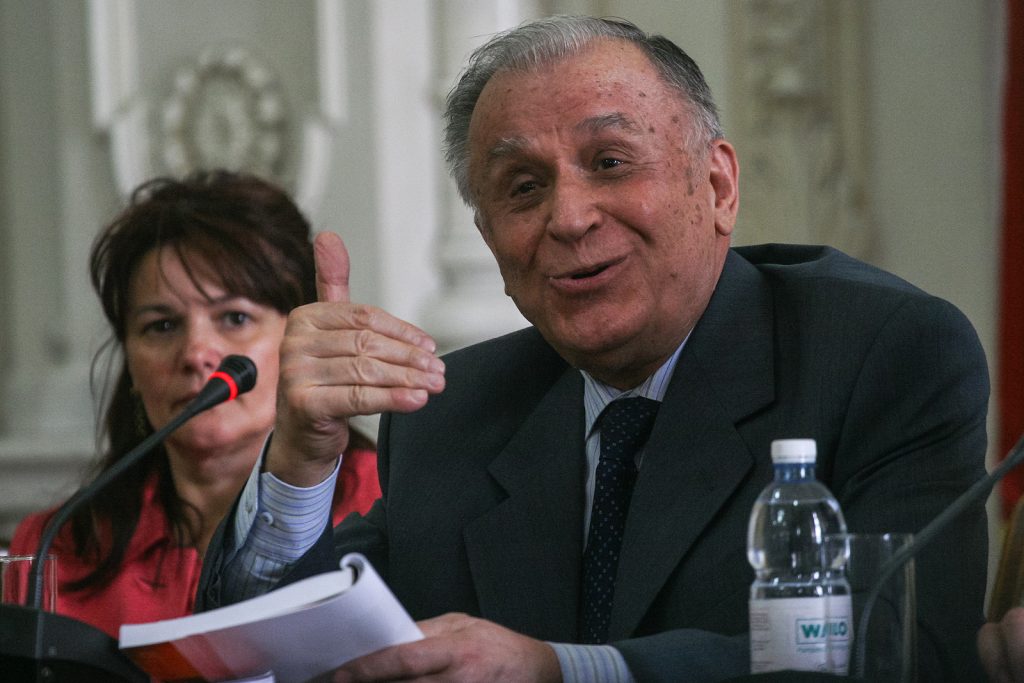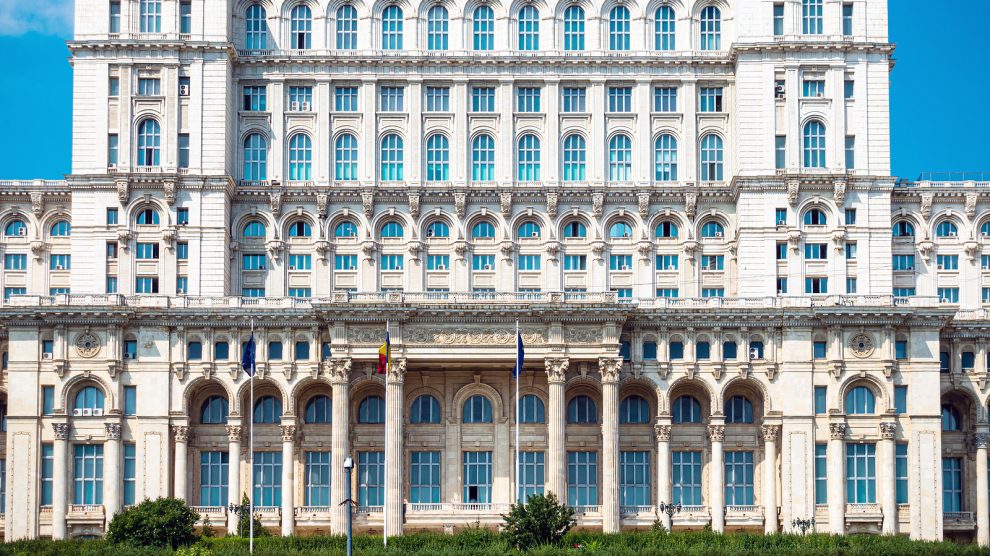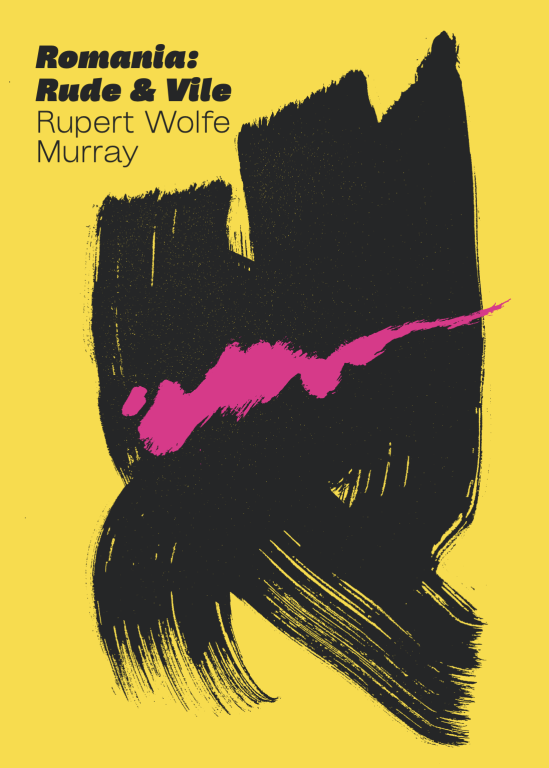In this exclusive extract from his new book, Romania: Rude & Vile, a collection of stories about travelling, politics, history, revolution, architecture, books, and people, author Rupert Wolfe Murray recounts a revealing encounter with Romania’s former president, Ion Iliescu.
The main tourist attraction in Bucharest is a building that was inspired by a visit to North Korea by Romania’s then communist dictator, Nicolae Ceauşescu in 1971.
Today, its official name is Parliament Palace. Before 1989 the name was the House of the People; foreign tourists call it Ceauşescu’s Palace. If you believe the hype it’s visible from the moon, it’s bigger than Cheops’ Pyramid and over a million cubic metres of marble were used in its construction.
It’s hard to find reliable information on how much it costs to run but I came up with the figure of twenty million euros a year; another source tells me that it cost about three billion euros to build.
- At Bucharest’s Spring Palace, once home of Nicolae Ceaușescu, kitsch knows no bounds
- In search of Romania, one of Europe’s most misunderstood countries
- The making of a Romanian staple, mămăligă
That almost every foreign visitor I came across in Bucharest would refer to it as Ceauşescu’s Palace feeds into the fevered narrative that Romania’s dictator built himself the biggest palace in the world. He actually built it as the nation’s administrative centre and today it houses Romania’s parliament, a vast conference centre where (ironically) NATO likes to gather, an art gallery, and various other things.
The dictator’s actual house was a relatively modest if kitsch villa in the Primavera area, Bucharest’s most exclusive neighbourhood.
A promising start
Many Romanians told me that Ceauşescu started out quite well – he stood up to the Russians, objected to their invasion of Czechoslovakia in 1968 and there was a relative sense of freedom in the late sixties.
For some years he was a darling of the West – who thought his independent role in international affairs would help in their struggle against the Soviet Union. He wangled a state visit to the US, and was also a guest of Queen Elizabeth II with whom he drove around London in a golden carriage.
My impression, after speaking to Romanians, was that Ceauşescu became a megalomaniac after that 1971 visit to Pyongyang. I’d been told the “whole” North Korean population turned out to cheer him, and from then on he wanted to organise Romania’s population along similar lines.
He evidently felt that his greatness needed to be appreciated on a grander scale. I was also told that Ceauşescu commissioned the vast House of the People so that he could stand on the balcony and look down the long Boulevard of the Victory of Socialism (today Unirii Boulevard) where millions of his subjects would gather, cheer, march-by, and wave little flags in unison. But he was overthrown before the building was finished or such crowds could be rounded up.
If you search for ‘Ceauşescu’s visit to North Korea’ on YouTube, you’ll see how this practice of mass-leader-worship looked, and what could have happened in Romania had the 1989 revolution not ejected him from power.
Romania’s communist-run TV station sent a film crew on the visit and they put together a well-made presentation that, today, fits quite well into the anarchic mix of material on YouTube.
Ceauşescu’s personality cult had an impact on every family, as all children would have been expected to contribute to the vast parades that endlessly celebrated the dictator – not to mention the tens of thousands of tradesmen who were forced to work on the People’s Palace building site, which operated twenty-four hours a day, seven days a week. My ex-wife was a schoolkid in communist-era Romania at the time and she had to take part in practice street parades, which were organised with military harshness. This was going on in every town and city. They were training the youth to worship the leader.
The Soviet Union had been the major influence on Romania’s post-war architecture, but from the 1970s the North Korean brutalist influence can also be seen. And it wasn’t just in the cities. In Romania’s beautiful villages they demolished many of the rambling peasant homes and herded them into jerry-built concrete blocks – all of which were uninsulated and most lacked any functional utilities. Other countries in the communist bloc had similar building programmes but nowhere else can you find a North Korean-inspired monstrosity like the House of the People.
Meeting Iliescu
Now, having told you this backstory, I’d like to tell you how I came across a new perspective on the North Korean connection.
December 2014 was the 25th anniversary of Romania’s revolution and the British Embassy in Bucharest organised a screening of After the Revolution, a film I had produced with a great filmmaker called Laurențiu Calciu.
It showed what people were talking about on the streets just after the overthrow of communism. The embassy wanted to invite some journalists who had covered the revolution back in December 1989 and I was asked to help find them. I contacted some of the British journalists who’d been in Bucharest at the time but the only one willing to fly out for the event was Chris Walker, formerly of The Times. He joined Alison Mutler, who still lives in Bucharest, and myself, and we all gave a short talk.
Chris Walker told me he wanted to meet Ion Iliescu, the first Romanian president after Nicolae Ceauşescu was shot by firing squad on Christmas Day 1989. All these years later Iliescu is still a divisive figure in Romania. Some Romanians consider him the one who brought stability to the country after a violent revolution, but the progressives tend to think he was a Russian stooge and they see the whole revolution as a stage-managed coup.
Iliescu became the interim (unelected) president after the revolution and held onto the job for six months before general elections were held.
In May 1990 he became Romania’s first democratically elected president after the revolution, winning with a huge majority. Despite this, some say he stole the election. I’ve never seen any convincing evidence of this but what I did see during that election in 1990 was that the incumbent, Iliescu, used all the resources of the state to organise a sophisticated election campaign – unlike the disorganised opposition. Iliescu had also done a good job of animating the corpse of the once omnipresent Communist party and flipping all the thousands of branch offices, in every factory, town and school, into supporters for himself as saviour of Romania. Having pulled that tricky act off, Iliescu had no need to steal votes.
Miners
His reputation for divisiveness was consolidated in June 1990, just after he’d won the presidential election. Iliescu felt threatened by street protests and he summoned thousands of miners, armed with crowbars, to attack the street protesters and anyone who stood in their way.
The government-controlled TV stations made it out that they’d come spontaneously, to defend the revolution. This was a moment of shame for Romania and a setback in its development. Prior to this moment there was great sympathy for the nation that had overthrown a brutal tyrant, but now the West realised that its new rulers were acting like a typical communist regime which cracks down on dissent then lies about it.
Iliescu stayed in power until 1996 and was then re-elected in 2000. His political party, the social democrats, or PSD in its Romanian acronym, still have the reputation of being nationalistic, opportunistic and corrupt.
But how does one meet Romania’s most notorious, living, former president? The British Embassy was no use at all so I resorted to contacting a journalistic fixer, one of those brilliant young networkers who are the lifeblood of foreign journalists – people who can work out how to get hold of virtually anyone. I’ve never been able to afford a fixer, or a translator – which is why I learned Romanian – but I’ve always admired them and knew a young one called Paul Lungu. He pulled a few strings, scratched some backs, made some calls and the very next day a meeting had been arranged.

Ion Iliescu
‘I was there’
So there we were: Ion Iliescu, Chris Walker, and myself, all sitting in an elegant reception room talking about the past. Chris wanted to know what had happened to so-and-so and I was trying to avoid controversial questions – like, Who ordered the shootings in December 1989? – as the visit was arranged as a friendly catch-up rather than a journalistic grilling.
Chris asked him about his time under communism and Iliescu said the regime had plenty of flaws but what made him most proud was that he helped spread education into the rural areas and to the poor. This, indeed, was a great achievement. But Chris didn’t know about North Korea’s influence on Romania and, getting a bit bored, I gave him a potted history. Then Iliescu interrupted me and said, in English:
I was there.
Where? I replied.
I was on that trip to North Korea.
Suddenly I was on full alert. Nothing of interest had been said thus far but this was new to me; here was a chance to learn something about that historic trip. I had no idea that Iliescu was even on the trip and I’m not sure if these memories have been written up anywhere (to be honest, I don’t have the patience to check – these old communist leaders tend to write long and very boring memoirs).
In 1971 Ion Iliescu was a youthful member of the Politburo, the communist-era cabinet that ruled the country. He was also on the Central Committee and was Minister for Youth. In other words he was a big shot; he’d risen to the top and was presumably one of Ceauşescu’s favourites.
Iliescu didn’t say anything about the actual visit to North Korea, but he seemed keen to talk about what happened on the long trip home (a flight via Moscow). This is my recollection of that conversation. On the plane to Moscow the Romanian leaders rubbed shoulders with a young African man, the son of a West African leader. Iliescu sat next to this African guy and heard all sorts of new political ideas about democracy and openness; it probably blew his mind as he’d only been exposed to communist ideas.
Full of enthusiasm, Iliescu went to speak with Ceauşescu who was sitting with his wife Elena on the plane. He said he’d heard some interesting political ideas from the young African and was keen to share them. Ceauşescu didn’t reply but his wife did. Apparently she pointed in the direction of the young African and said, “What? You’ve been listening to that nigger?”
End of conversation.

Exile
It was also the end of Iliescu’s career at the top of the Romanian Communist party. Soon after he got back from that trip he was kicked out of his high-level functions and exiled to a minor publishing role. He was never offered an explanation.
I’ve always been interested in that 1971 trip to North Korea as it seemed to change the fate of Romania, and here I was getting an insight from someone who was there. It was just a fragment of the story and I was unable to get another meeting with Iliescu as he started being investigated for his role in the massacres that took place during the December 1989 Revolution.
But it helped me understand a few things. The fact that Iliescu even approached Ceauşescu with a personal observation suggests that the two of them had been friendly and that the dictator was perhaps open to ideas.
Was this the moment when he was adopting a new political approach? One that was building on the cult-of-personality, the North Korean approach. Was this the moment when he could no longer handle any other viewpoints?
The Wikipedia history of Iliescu says that he challenged the dictator in terms of his policy and was marginalised as a result. But was it in fact this conversation on the flight that scuppered his career as a communist high-flyer?
I hope someone finds out, or perhaps Mr Iliescu would like to send me his own version of events.
Romania: Rude & Vile can be purchased from Amazon.
Unlike many news and information platforms, Emerging Europe is free to read, and always will be. There is no paywall here. We are independent, not affiliated with nor representing any political party or business organisation. We want the very best for emerging Europe, nothing more, nothing less. Your support will help us continue to spread the word about this amazing region.
You can contribute here. Thank you.








Why this abusive title for a book “Romania Rude &Vile”? I’ve lived through that era as an ordinary young person and the title just add insult to injury. Why did Romania and Romanians so wrong to be subject to such never ending mockery and insult from the British, not forgetting that the Brexit narrative was built on the vilification of Romanians? I don’t care about whatever Wolf Murray or any pathetic Brit think about Romania, and will never buy a book with such an abject title.
I am grateful for the comment from Dacia Felix as it gives me the opportunity to explain my book’s title.
The fact is that most westerners have a negative view of Romania and I believe addressing that with images of beautiful landscapes, buildings and women — as the Romanian government do when promoting Romania abroad — does not work. People don’t trust those beautiful TV ads that are broadcast around the world, as huge expense. You have to address the negatives AND the positives, in order to communicate that Romania is a great, complex and ancient country — and the people are really friendly.
It’s a shame you’re not willing to read my book as you’ll see that I have a lot of praise for Romania, as well as criticism, and you would realise that I am very sympathetic to your nation. I also discuss the rabid nationalism that the British tabloid press take towards Romania and its role in Brexit. In other words I’m as critical of my own country as I am of yours.
I also praise the Romanian legal system for standing up to the multi-billion organisation that wants to pollute Rosia Montana, as well as throwing the leader of the ruling party in jail (Dragnea). These things are really impressive, especially when you consider that the legal system of the USA is finding it impossible to press charges on the rogue leader of one of their political parties.
So, in conclusion, I am sorry if you took offense at my book title, but if you read it (even the free sample on Amazon) you will see that I am a strong advocate of your nation.
@Wolfe Murray
Your answer is a long verbal salad which explains nothing, especially the deeply offensive title. You did not address the main issue: the appallling title of the book and why you choose it.
I have seen the manipulation technique you used in the British media: the pretence of a favourable review of something (in this case of my country Romania) which is in fact subtly negative. Starting with the title. Your pretend to be “nice” to Romania but the title gave away the intent. The overall objective is for readers to remain with the title in mind: Romania is vile and rude. Your alleged positive review of the country is irrelevant and uncalled. Romanians do not need the validation of any foreigner.
I stress again: the title is offensive in itself to any Romanian and coming from a Brit, confirming Brexit bias. You and the rest of UK would have hit the roof if a Romanian had written a book titled : Britain rude&vile, irrespective of its content. Romanians are not that vile and rude to do that to the UK, although Britons fully deserve to get the media treatment they gave to Romanians. I rest on my case.
In reply to your second comment, I don’t think any sensible Brit would object to a book with such an offensive title. Isn’t it better to have an offensive title, but positive content, than a positive title but a negative attitude in the book? As you refuse to buy the book, you will not be able to read the chapter called “How the Words Rude and Vile Help Understand Romania”, but I will give you a clue: think of the Romanian meanings of the words rude and vile.
@Wolfe Murray
Quite right, any sensible or not Brit would NOT be offended by the title because slandering Romania and Romanians is what the British media and politicians do since 2007. It is British normal to offend Romanians.
Those who will be offended by the title will Romanians but who cares about Romanians? Not the Brits anyway.
I will never read any book with such a rude&vile title. Never. I close the discussion here.
You mis-understand me. If I was to produce a book called “Britain: Rude and Vile” I don’t think any Brit would object, as we are so used to insulting our own country and we’re not super sensitive when someone else does.